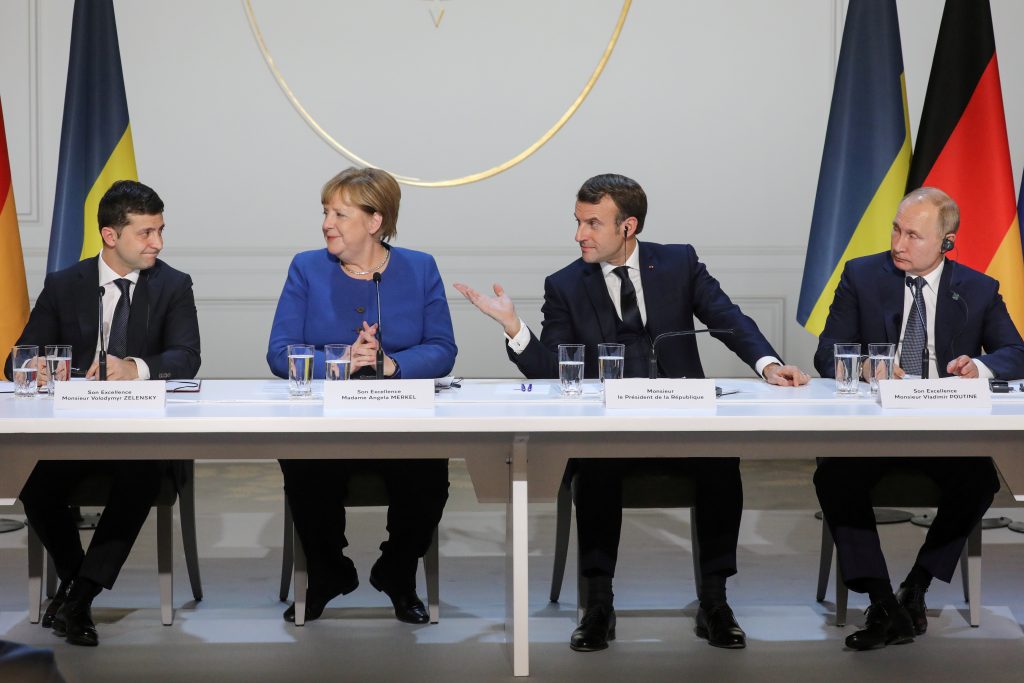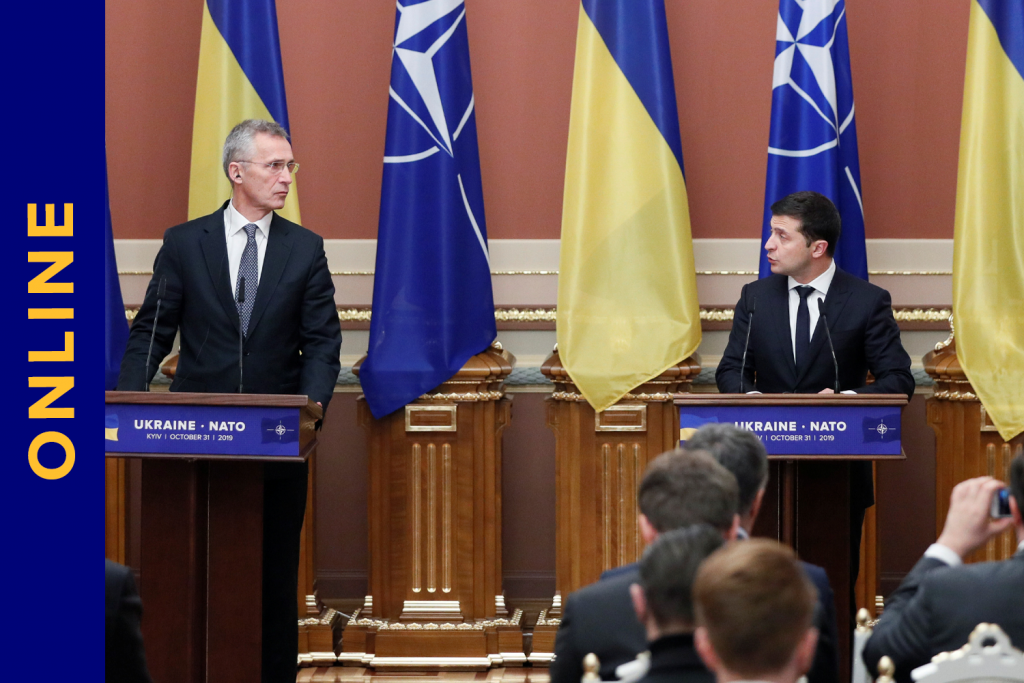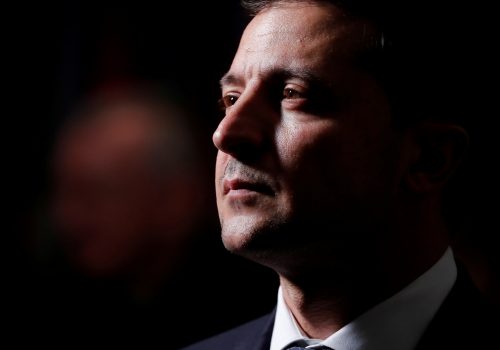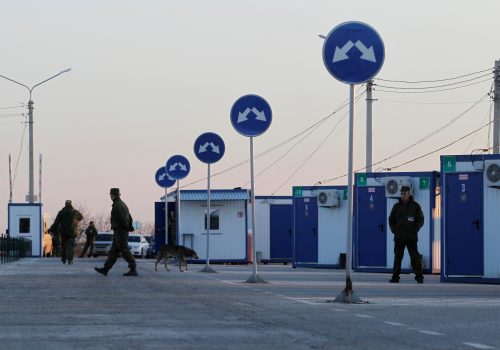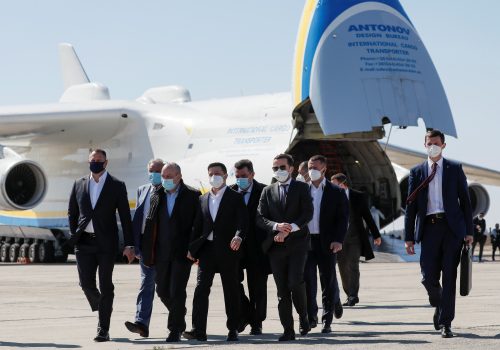On May 13, the Eurasia Center hosted an event assessing Ukrainian President Volodymyr Zelenskyy’s foreign policy one year in. Think tank expert Alyona Getmanchuk, journalist Bohdan Nahaylo, Ambassador Steven Pifer, and former Defense Minister Andriy Zagorodnyuk participated. Due to time constraints, panelists were unable to address all of the questions posed by the audience during the event itself. Below are responses to a selection of these questions
How is COVID-19 affecting the negotiating stance of the Kremlin vis-à-vis Ukraine? In the past, Russian President Vladimir Putin has used foreign policy to distract from domestic troubles, is it possible we might see a more aggressive Putin in Ukraine? Or do you see the crisis ultimately weakening Russia and thus fundamentally changing its policy of delegitimization of Ukraine?
Ambassador Steven Pifer, William J. Perry Fellow, Freeman Spogli Institute for International Studies, Stanford University; Nonresident Senior Fellow, Brookings Institution: COVID-19 is taking its toll on the Russian economy, as is the fall in global energy prices. That said, it does not appear that the virus’s impact has, as of yet, caused the Kremlin to reassess its approach toward Ukraine, particularly toward settling the conflict in the Donbas. But that might still change. I doubt that Putin could successfully use a more aggressive stance toward Ukraine, such as a new offensive in the Donbas, to divert attention from COVID-19 and recession at home or to reverse his sliding approval ratings; he will need to do something.
Alyona Getmanchuk, Director, New Europe Center: There is no sign that Russia’s approach to Ukraine might change because of COVID-19. Even if the pandemic and the oil crisis are weakening Putin’s stance, the Kremlin is expecting that Ukraine’s position will be even weaker. We are witnessing Russia stick to its well-known position on the Donbas by, for example, imposing direct talks between Kyiv and the so-called “Republics.” Moreover, there is a threat that we may get an even more aggressive, hawkish Moscow if it does not reach its agenda regarding Donbas negotiations.
Bohdan Nahaylo, British-Ukrainian journalist: It’s too early to say. Guesswork and speculation aside, there are no definite new results on the ground to point to. Cross-contact line shelling and sniper fire continue, and casualties continue to grow. We do not know if Dmitry Kozak’s recent talks behind closed doors in Berlin have signaled any new flexibility in Moscow’s stance.
What will be the impact of COVID-19 on Ukrainian foreign policy: Is it shifting quickly enough to deal with a COVID and post-COVID geo-global scene? Do you think the pandemic will cause less constructive contact or dialogue with the European Union?
Pifer: COVID-19 will likely complicate Kyiv’s effort to pursue its foreign policy. Dealing with the virus and with its economic consequences is understandably is going to take the time and attention of both Ukrainian leaders and leaders of Ukraine’s partners in the West. The temporary impact will be a lesser pace of dialogue and cooperation.
Getmanchuk: Ukrainian diplomacy has been adapting to this new reality quite quickly and creatively. For example, Ukraine’s Foreign Minister Dmytro Kuleba carried out the first virtual visit to Germany in Ukrainian diplomacy. As a result of COVID-19, Ukraine has received a chance to show that it can be a reliable contributor to transatlantic security. Ukraine’s Antonov planes, including the largest in the world “Mriya” transport plane, are playing an essential role in delivering medical equipment from China to NATO member states during the pandemic. As a sign of solidarity, Ukraine has provided its assistance to Italy despite criticism from Zelenskyy’s opponents.
Andriy Zagorodnyuk, Former Minister of Defense of Ukraine: I do not think we shall expect any substantial changes in the policy itself. Perhaps the biggest challenge will be the fact that every country will have a substantially increased amount of domestic issues while recovering from the consequences of COVID-19. That will lead to more diversion from foreign policy issues, which may work against Ukraine. Russia will be actively lobbying for the release of sanctions, demonstratively ‘helping’ countries to overcome COVID-19, offering deals of various kinds, which will impact the overall foreign relations context.
Due to COVID-19, could we see an upgraded relationship between Ukraine and China? What do you think of the increased influence of China in Ukraine, and how do you think the Kremlin views this blossoming presence?
Getmanchuk: What we see is a strengthening of Chinese “soft power” in Ukraine. According to recent opinion polls, 34 percent of Ukrainians believe that China is a country that can help Ukraine be the most effective in its fight against the coronavirus pandemic. At the same time, only 10 percent chose the European Union and 8.7 percent named the United States. In the same way, it is unclear how China and Ukraine will use the momentum. In 2019, China emerged as Ukraine’s biggest bilateral trade partner. Ukraine has also started developing its Asia strategy, which is more a result of new leadership at the foreign ministry than COVID-19.
Nahaylo: China has indeed raised its profile in Ukraine as a result of the COVID-19 pandemic, but it is not yet evident if it is to Beijing’s advantage or disadvantage.
President Zelenskyy recently visited Berdyansk, a port on the Azov Sea, and decided to make the city a base for Ukraine’s military navy in the Azov Sea. What do you think about this decision and its possible future development?
Zagorodnyuk: Plans for Berdyansk to be the main navy base in the Sea of Azov have been in place for some time. Berdyansk has a much better strategic position in the Sea of Azov than other ports. The Berdyansk port infrastructure needs upgrades and investments though.
Stay updated
As the world watches the Russian invasion of Ukraine unfold, UkraineAlert delivers the best Atlantic Council expert insight and analysis on Ukraine twice a week directly to your inbox.
Major General (Ret.) Havrylov published a letter on April 15, 2020, explaining that defense reforms need leadership and that no National Security Strategy has been prepared. Is there any chance that this is changing?
Zagorodnyuk: The National Security Strategy publication is quite late. The draft was ready during fall 2019, but its approval was delayed for a while. Finally, it was adopted by the National Security and Defense Council of Ukraine on January 17 but is not yet published for some reason. I believe it may be revised due to COVID-19; however, we saw delays with its publication prior to the pandemic. The new security and defense deputy head of the president’s office has been recently appointed, and I believe we can expect revision and publication soon. The military strategy (the main military policy paper in Ukraine) must be adopted after the National Security Strategy is published; thus, it is delayed as well. The working draft for the military strategy was prepared by the Ministry of Defense of Ukraine some time ago. I sincerely hope these crucial documents will be published soon as their absence impacts Ukraine’s strategic policy and planning process.
Additionally, to what extent is Ukraine moving towards opening access to private, innovative defense companies?
Zagorodnyuk: The acquisition system needs an upgrade to make defense procurement open to new suppliers, specifically the weapons and military equipment sections. The other part, involving products such as clothing, food, fuel, housing, and services such as construction, and repairs, were liberalized some time ago. Weapons and equipment acquisitions are regulated by a separate law, which needs a complete change. There has been lots of work done in this direction over the last several months while the new draft law has been prepared. It will set out new standards for the procurement process, which shall make it more transparent and open for free competition. The law has passed its first hearing in parliament and needs to pass a second one expected soon. After the president signs the law, some technical regulations also must be changed. We can expect a new system of procurement by the end of the year. Some international advisors are working on this matter, including from the US Department of Defense. There is a good chance, subject to Ukraine’s Ministry of Defense policy on this matter remaining unchanged and attention to this work duly paid, we can expect updated defense acquisition regulations.
Officials in Ukraine have expressed aspirations to join NATO’s “Enhanced Opportunities Partners” (EOP) program. How much support is there for this among NATO members? What are the chances of resuming meetings of the Ukraine-NATO Commission? Are stronger military and diplomatic support needed for Ukraine or other countries seeking to join the European Union or NATO?
Pifer: I’m not exactly sure where NATO is on the question of Ukraine joining the Enhanced Opportunities Partnership program. But it seems to me more important that Ukraine focus on practical steps to reform and make its military more compatible with NATO standards rather than the name of the program. Ukraine can do a lot in the context of its current annual action plan with the Alliance and, at the end of the day, NATO members will pay more attention to actions and practical steps than the program’s name.
Zagorodnyuk: I have raised the idea with the ministers of defense from NATO countries during a ministerial meeting in Brussels in February 2020. The majority of countries were pro-EOP. Some have raised this matter as contingent on ongoing reforms, which we were happy to accept. We have also discussed this issue with several ministers during the Munich Security Conference bilateral meetings. While some countries still require diplomatic work, the outlook was generally very positive. The chances of resuming meetings of the Ukraine-NATO Commission are reasonably high and subject to a positive outcome of the Ukraine-Hungary presidential bilateral. All requirements of the Venice Commission, regarding Hungarian minorities, were fulfilled by Ukraine.If Ukraine shows good reform progress and articulates it well, there should be no lack of support for EOP. The post-COVID situation may impact the lesser interest to the matter, but we still shall proceed as planned. On NATO full membership, it is just too early to discuss. We need to continue with real reform, get EOP, establish an image of a reforming, successfully governed nation, and then get to the next stage.
Do you see any space for new negotiation formats that would involve Ukraine’s key non-EU partners? Furthermore, is it necessary for the United States and others to further strengthen Ukraine’s military capabilities to increase Russia’s cost to continue the war?
Pifer: The United States and individual NATO members should continue to provide military assistance to Ukraine, though the Ukrainian military today is far better than it was in 2014, and Moscow undoubtedly understands that. As for altering the negotiating format, there could be a role for enhanced US engagement at some point, but that should support, not displace, the German-French effort (which is key to maintaining EU sanctions). To be frank, I am not sure that US engagement at the highest level right now would be all that helpful.
Getmanchuk: Unfortunately, changes in the negotiation formats will not have a significant impact on the situation. Peace in the region depends on Putin’s understanding that he is losing more than he is gaining by waging war in Ukraine. That is why the West’s firm position on sanctions and other things which keep Russia accountable is important. Strengthening Ukraine’s military capability is an important contribution to Ukraine’s resilience.
On March 4, Zelenskyy fired a large portion of his cabinet. In the time since he has done nothing to ease the worries of observers. To what extent do you think President Zelenskyy understands the value of the progress on reforms required to sustain Western support for Ukraine?
Pifer: Domestic developments in Ukraine since March 4 are worrisome and have raised questions about the depth of commitment of Zelenskyy to genuine reform. He can still be a transformational leader, or he can be reluctant to take bold reform steps, confront corruption or curb the outsized political and economic influence of the oligarchs. If it is the latter case, the West has seen that movie several times before. That could weaken support for Ukraine; in particular, it could lead to a new burst of Ukraine fatigue in Europe, where some countries already would like to get back to business as usual with Moscow.
Getmanchuk: Ukraine’s president prefers listening to the positions and reactions of actors within the country rather than the advice of international partners. This preference is according to the logic that there were Ukrainians who made him the president, not foreign figures. Thus, unlike his predecessor, Zelenskyy appears to be less open to the recommendations of Western partners. This was especially clear in the situation with the dismissal of General Prosecutor Ruslan Ryaboshapka. G7 Ambassadors only did a disservice to the dismissed prosecutor general when they decided to petition the president for Ryaboshapka to stay in the position. Zelenskyy demonstrates more and more clearly that the era of co-ownership over Ukrainian reforms is coming to an end. He shows that Ukrainian reforms are a domestic matter for Ukraine. This approach coincides with the sentiments of Ukrainians: the number of Ukrainians who consider Western countries drivers of reforms in Ukraine has decreased recently from 25 to 12 percent.
Nahaylo: This is not really related to Zelenskyy and foreign policy as such. In terms of recognizing the need for unblocking support from the IMF and other donors and creditors, despite internal upheavals, he has managed to push through the two laws that were stumbling blocks—removing the moratorium on the privatization of farm land and getting the “anti-Kolomoisky bill” adopted. Bringing in Saakashvili into his team is also probably aimed in part at allaying external concerns. As for redlines in this sense, they are not as clear and fixed as in dealings with Russia. Much depends on the alignment of forces at any time, among the oligarchs and reflected in the parliament.
How far do you feel that Ukraine’s domestic politics constrain Zelenskyy: what redlines does he face from Ukrainian public, veterans’ groups, etc. and what would be the consequences for Ukrainian stability of crossing them?
Zagorodnyuk: The clear redlines are related to the matter of managing risks of any new framework of the Minsk process. Active members of the public are very attentively looking at any developments there. People are clearly aware this is a very risky process.
Why is the Trilateral Contact Group still wrestling with recognizing Luhansk and Donetsk Republics? Do you think it is vital to involve current residents of the occupied Donbas in peace negotiations and, if so, how should representatives be chosen?
Nahaylo: The Trilateral Contact Group is not wrestling with this challenge; it is Russia that has insisted all along that Kyiv deal directly with its proxies in Donetsk and Luhansk and thereby recognize them thereby allowing it to shun its responsibility for imposing and propping them up. How to move toward reconciliation and confidence-building as part of any future peace process is a key question. Russia is probably looking for a face-saving arrangement which Ukraine fears will produce a Trojan Horse to weaken it from within. It is important for Kyiv to counter Moscow’s claims that the latter’s puppets legitimately represent occupied territories that have been in effect ethnically cleansed of their “Ukrainian” inhabitants. Those forced to flee by Russian arms and intolerance need to be heard loudly and clearly.
Zagorodnyuk: The formal position is correct: there are no such things as the Luhansk People’s Republic and the Donetsk People’s Republic. They are Russian proxies and came to power by breaching all imaginable laws and were funded and equipped by Russia. There is no way any process can result in a constructive outcome if we imagine anyone changing that approach.
Asking how to involve current residents of the Donbas in peace negotiations is an excellent question. Generally, the idea to include people from local communities looks interesting. However, how to choose them, how to ensure they have a qualified and unbiased position, how to prevent their brainwashing by local propaganda, how to ensure their freedom of speech and safety, is a big question.
Is there any strategy that will end the Russo-Ukrainian war on terms favorable to Ukraine? Winning the war will require several elements of national power, what is President Zelenskyy willing to assert- i.e., economic, diplomatic, military, international opinion?
Pifer: Zelenskyy can take steps to bolster Ukraine’s position vis-a-vis Russia, such as pursuing dramatic reforms that create a more open, competitive, and growing economy. That will strengthen both Ukraine’s political and military standing. But the Kremlin gets a vote on when to end the war that Russia has inflicted on Ukraine. As before, the issue remains what can Ukraine and its Western supporters do to change the Kremlin’s cost-benefit calculation.
Nahaylo: The only strategy of this sort is to put Ukraine in order by pursuing a clear and determined reformist course, one that will ensure an independent judiciary, the rule of law, law and order, and combating corruption. Ukraine must also tame the oligarchs, stimulate economic recovery, maintain the confidence of external allies and supporters, and pursue a consistent and unambiguous policy. This policy would need to be both patriotic and inclusive in consolidating a modern Ukrainian political nation.
Zagorodnyuk: It is a question which cannot be answered shortly, but yes, there are several scenarios and strategies in place. Maintaining sanctions, strengthening military capabilities, enhancing resilience in the Joint Forces Operation zone, applying pressure on Russia to reach an agreement, demanding a complete ceasefire, proceeding with further prisoner of war exchanges, requesting the delivery of all points of the Minsk agreement which are currently breached by Russia, strengthening diplomatic relations, and developing Ukraine domestically as a free, democratic, and prosperous nation—all of that needs to happen to win the war.
Adair Appleton is a program assistant at the Atlantic Council’s Eurasia Center.
Further reading
The views expressed in UkraineAlert are solely those of the authors and do not necessarily reflect the views of the Atlantic Council, its staff, or its supporters.

The Eurasia Center’s mission is to enhance transatlantic cooperation in promoting stability, democratic values and prosperity in Eurasia, from Eastern Europe and Turkey in the West to the Caucasus, Russia and Central Asia in the East.
Follow us on social media
and support our work
Image: (From L) Ukrainian President Volodymyr Zelenskiy, German Chancellor Angela Merkel, French President Emmanuel Macron and Russian President Vladimir Putin give a press conference after a summit on Ukraine at the Elysee Palace in Paris, December 9, 2019. Ludovic Marin/Pool via REUTERS
